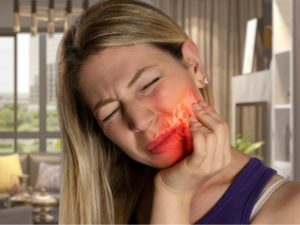
When whiplash occurs due to an automobile accident, you may experience jaw pain and limited movement that can easily be overlooked and undiagnosed. You may have a temporomandibular joint (TMJ) injury that can have long-term consequences.
It’s best not to assume that the pain will resolve on its own. Getting a correct diagnosis and effective treatment for a TMJ injury is necessary but may be a challenge. It can take time and cost a bundle.
At Christensen Law, our experienced Michigan car accident lawyers will work to secure full and fair payout for your TMJ injury and other damages resulting from the wreck. Rest assured that we will fight vigorously so that your car accident claim accounts for all of your losses, both now and in the future.
Learn more in a free consultation by calling or contacting us today.
What Causes Jaw Pain After a Crash?
 Jaw pain can begin if the head hits the dashboard, window, steering wheel or other stationary objects during a car accident. Some victims report that the trauma of an airbag suddenly inflating against the head or face spurs jaw pain, at times leading to a TMJ injury.
Jaw pain can begin if the head hits the dashboard, window, steering wheel or other stationary objects during a car accident. Some victims report that the trauma of an airbag suddenly inflating against the head or face spurs jaw pain, at times leading to a TMJ injury.
The TMJ is one of the most complex joints in the body. It links your jawbone to the base of your skull, sliding up and down and back and forth as needed. It’s also one of the most frequently used joints. The TMJ performs important functions that allow you to eat, drink, speak, smile, laugh, sing, yawn, play a wind instrument, and brush your teeth.
When the TMJ is injured, you can feel pain in the jaw, face, neck, ears, and shoulders. You can also suffer from debilitating headaches. It also happens if you witness an accident about to happen and instinctively clench your teeth.
What Is Whiplash-Induced TMJ?
Some car accidents result in whiplash, especially in rear-end collisions when the head suddenly lurches forward then reverts violently backward. About one-third of whiplash victims are at risk for a TMJ injury.
Even a crash at nine miles per hour can cause whiplash and a possible TMJ dislocation. The joint and soft tissues surrounding it are very vulnerable to trauma.
The discomfort and limited mobility of a TMJ injury can have far-reaching impacts. It can affect your work, activities of daily living, mouth hygiene, and mental health.
A TMJ injury is often missed, even when whiplash is correctly diagnosed. Sometimes symptoms do not surface until years later.
TMJ Symptoms to Watch for After a Car Accident
Jaw pain is the primary symptom of whiplash-induced TMJ. But because the TMJ is connected to so many other parts of the body, a host of other symptoms can develop as well. It’s important to be on the lookout for these signs and symptoms:
- Pain or tenderness in the jaw, face, neck or shoulders
- Clicking or popping sound when you move your jaw
- Ear pain or ringing in the ears (tinnitus)
- Difficulty chewing or pain while chewing
- Swelling on the side of the face
- Lockjaw or limited movement of the jaw
- Headaches
- Dizziness
- Fatigue
You may only experience a few of these symptoms or, in some cases, all of them. If you’re in a car accident and develop any of these complaints, see your doctor immediately.
What to Do if You Have Jaw Pain After an Accident
If you experience jaw pain after a car accident, there are steps you can take to protect your health and well-being.
First, see your doctor or go to the emergency room if you have severe pain or difficulty moving your jaw. If you suspect a TMJ injury, ask to be referred to a dentist or oral surgeon who specializes in treating this condition.
You should also avoid hard or chewy foods and eat a soft diet until the pain subsides. Over-the-counter pain relievers, ice packs, and heat can also help alleviate discomfort.
Be sure to get plenty of rest and avoid stressful situations, as they can aggravate TMJ pain. You may also want to try relaxation techniques, such as yoga or meditation, to ease stress and tension.
In some cases, your dentist or oral surgeon may recommend a mouth guard or splint to stabilize the TMJ and allow it to heal. Physical therapy, injections, and surgery are other possible treatments, but they should be considered only after more conservative measures have failed.
You may also need to consult with a Michigan personal injury lawyer if your TMJ pain is the result of someone else’s negligence. An experienced attorney can help you get the compensation you deserve for your injuries, pain and suffering, and other losses.
Can I Recover Damages from TMJ?
Diagnosis requires a doctor and possibly other medical professionals such as dentists, radiologists, ear, nose, and throat specialists, and various rehab experts in speech, physical therapy, and occupational therapy.
Brace yourself if you expect to pay for all this evaluation and treatment on your own. The cost of medical treatment, rehabilitation, and any necessary surgery can add up. Fortunately, you have some options.
First, you can recoup your medical costs and lost wages from a temporomandibular joint injury through your Michigan no-fault insurance. But if you run into problems getting the coverage you need, you may also be able to sue for your TMJ injury. An experienced car accident lawyer can help you throughout the entire claims process and advise you of your options.
Christensen Law Can Protect You After Your Car Accident
After a Michigan car crash, let Christensen Law fight for the full measure of compensation and justice you are due. Contact us today. Your initial consultation is free.






